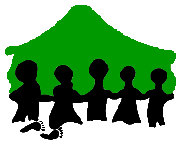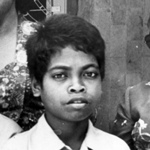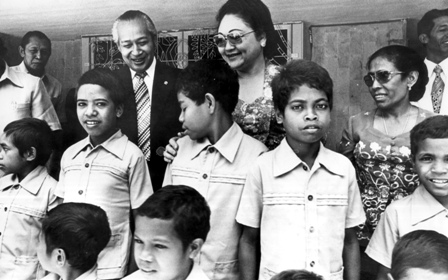Place of birth: Maubessi, Ainaro
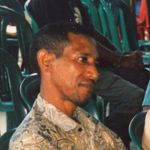
Petrus Kanisius, 2004 (Photo: Helene van Klinken)
‘My parents died a few years before the Indonesian invasion. My older brother and sister cared for me and my two younger siblings. When the Indonesian soldiers approached Maubessi, I ran to hide in the forest with other villagers. In January 1977 we were captured, and the soldiers sent us to Aileu. In Aileu I returned to school where I was in the fourth grade. Not long afterwards, soldiers from the Aileu district military post, asked the people to register children, under ten years of age, who had no parents. The soldiers said they wanted to select several children without parents to send them to school. At that time I was ten. My seven-year-old cousin and I were chosen from among the Maubessi people living in the concentration camp in Aileu; two other children from Aileu were also selected. In April 1977, soldiers took us to the Seroja institution in Dili, and I started going to school again. Two weeks later, my brother came to Dili to visit me.
Seroja Institution
There was a five storey building used as army headquarters near Seroja. Every Friday and Sunday soldiers from the headquarters visited us. They taught us about integration and to sing national songs. We didn’t feel afraid, but the discipline was very strict. We all had to follow the strict routine, with no exception made for the younger children.
Towards the end of August the staff told us that we would be sent to Java to go to school. They began organising the things we would need for the trip, but they did not contact our families to tell them we were being sent away. There were exactly twenty of us. We came from all over East Timor. Some, like me, had no parents, though we still had family members who cared about us. The parents of some children were still in the forest. Some children had been separated from their parents when they were running from attacks. If soldiers found a separated child, sometimes they gave them their own name. One child in our group was like that; he was called Gatot. I was one of the oldest in the group and in the highest class at school.
Jakarta
About one week later, on 1 September 1977, we left for Jakarta on a military aircraft. Lieut. Col. Mulyadi from Sulawesi and the governor of East Timor, Arnando dos Reis Araujo, accompanied us. A special bus from the presidential palace met us at the airport and we took us to the Catholic Fransciscan Vicensius institution where we stayed for several days. We were given yellow uniforms and we had to wear them wherever we went. There was a special program arranged for us. Everywhere we went soldiers went with us. I don’t know why we always had military escorts; we were only children. We visited the sights of Jakarta, such as Taman Mini (Indonesia in Miniature Park). On 3 September 1977 the soldiers took us to meet President Suharto and his wife at the presidential palace.
In the bus on the way home from the palace we were given gifts—a school bag, shoes and clothes. They all had our names on them and the sizes seemed to be right. We got back to Vicencius institution and that same evening we took the night train to Semarang, in Central Java. We arrived early in the morning and were taken to the Gatot Subroto army barracks in Semarang. At about 7 am we set off for Ungaran, 20 km to the south. The plan was to send us to St Thomas institution, run by the Catholic sisters of the ADSK order.
St Thomas Institution, Central Java
The entrance hall of St Thomas was decorated with flowers and a special carpet was laid out. The governors of East Timor and Central Java were there, as well as the minister for social welfare and other government officials. At the ceremony we were officially handed over to the sisters at the institution.
My family did not know I was in Java until one year later. In 1978 Agostinho, one of our group from Aileu, died in Ungaran. A letter was sent to the sub-district head in Aileu to inform his family. Everyone there thought it was me who had died, and my family began preparing the burial ceremony to call the spirit of the dead. I also sent them a letter, which arrived at about the same time. That was how my family knew that I was in Java. My older brother was not able to visit Dili to check on me after that first trip, as he was forced to join the civil guard, hansip.
At the beginning things went well at St Thomas institution, but then problems began to arise. We started to show that we were East Timorese. We were not obedient like the Javanese students living there: we were naughty, really naughty, and the sisters were annoyed with us. It turned out the sisters did not have enough money to cover our expenses. According to the sisters the amount received from the government was Rp13,000 per month, which was not enough to cover food and drink, let alone clothes, soap, books, school fees and other expenses. Not all the students living there came from poor families. The sisters used their fees to help cover the costs of poorer students. The sisters were afraid our behaviour would drive away their paying students. The president had promised us when we visited him at his palace that everything was going to be paid by the government. Maybe St Thomas didn’t receive the money, I don’t know, but I felt betrayed.
Living apart
In 1983, when I was about 15 years old, we were moved out of the main asrama (dormitories) where we lived into another asrama a little distance away on a small hill. It was built for us by the government in Semarang. We lived there with the children who had the same status as us, orphans and illegitimate children. We could no longer eat and mix with the paying students. The sisters who cared for us told us that we had to learn to be independent. I wasn’t sure what that meant, but I soon learnt. We were divided into groups and in the mornings before and after school we had to work; we had to tend the gardens planting sweet potatoes and looking after the fruit trees. Before school we drank tea and ate some snacks that we had collected, like sweet potato or cassava. After school we had to work again. We only got our main meal brought to us at four o’clock in the afternoon. But there was often not enough food, and we always felt hungry. If we asked for food they said we were greedy. One day after school we were working in the garden and feeling very tired and thirsty, so we climbed a coconut tree and ate some of the fruit. When the sister brought us food on her motorbike at 4 pm, somehow her instinct told her that we had taken fruit from the trees. She went over to the creek where we had thrown the husks. She was angry with us and asked us one by one who was responsible. As the oldest, I said I told them to do it. My punishment was to kneel under the tree for one hour and the others had to wait to eat. When the sister returned she saw that I had dirty legs from kneeling, so we were allowed eat. The young assistant who had been left in charge to watch me told me to make my legs dirty to help convince the sister.
Disappearance of Henrique Araujo
Not long after this a reporter from Suara Merdeka, the Central Java newspaper, came to interview the sister. Maybe the sister was trying to give attention to our situation, because the article mentioned that the government was responsible for us. The news article also said that the East Timorese students living there ate plants and roots, food for animals that Javanese never eat. When we saw the article we were really mad with the sister for saying that we ate animal food, and also with the reporter for writing it like that. We refused to go to school for one week.
Five students could stand it no longer and ran away. They got on a bus but had no idea what their plan was; also they had no money. When asked by the conductor, they said, “We’re the president’s children,” expecting not to pay. Because of the recent publicity in the press, many people had heard about the “President’s children.” The sisters had contacted the police and the bus staff had been told to look out for them, so they didn’t get very far. However one of the five, Henrique Araujo from Same, disappeared. I was upset about Henrique, but there was no effort to find him. Without telling the sisters, together with a few others, I went to the Department of Social Welfare and complained. The staff just replied, “Let him get lost. Die. Don’t bother looking for him.” We wrote protest letters to the parliament (DPR), also the upper house (MPR) and the president, but nothing ever happened, and I have never heard about Henrique since then. The authorities just didn’t care. I felt that our lives had no value in their eyes. We suffered in East Timor, then we were sent to St Thomas where we also suffered, and to this was added even a greater suffering, the loss of one of our friends.
Henrique’s disappearance made us think about our situation. We now understood that no one would look out for us and we agreed together that we had better do what they asked—work, study hard and not make demands—otherwise we might suffer a similar fate to Henrique. Several older East Timorese university students studying in Yogyakarta came to visit and talk to us, Domingus Maia and Armindo Maia. That helped, and the situation became a bit better. At least, when we got home from school we were allowed to eat before going to the gardens. The sisters also decided that our group would split up, some going to Yogyakarta, Surabaya and Jakarta. I stayed in St Thomas. Everyone worked hard, but the sisters still did not acknowledge that East Timorese students were also clever.
We didn’t have any further contact with the government. Lots of people, including rich people and even film stars, came and asked if they could adopt us. But the sisters told these people that if they wanted to help they should make a donation to St Thomas.
Read also:
Dharmais Foundation sent the children to Java
Visit of the children to the home of President Suharto
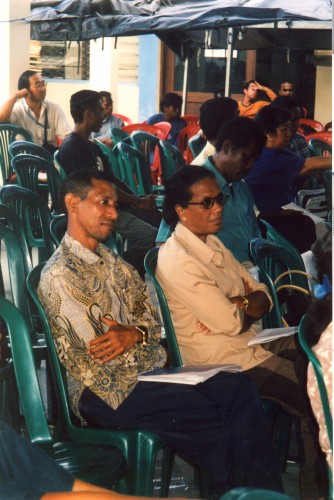
Petrus Kanisius, CAVR public hearing ‘Children and conflict,’ Dili, 29-30 March 2004; with Maria Margarida Babo, former staff member of Panti Asuhan Seroja (Photo: Helene van Klinken)
Petrus Kanisius Antonio Algeria spent seventeen years studying in Central Java. He graduated from the School of Philosophy at Sanata Dharma University in Yogyakarta in 1994, after which he returned to East Timor. After 1999 he was appointedprincipal of the 10 December Junior High School in Comoro, Dili.

